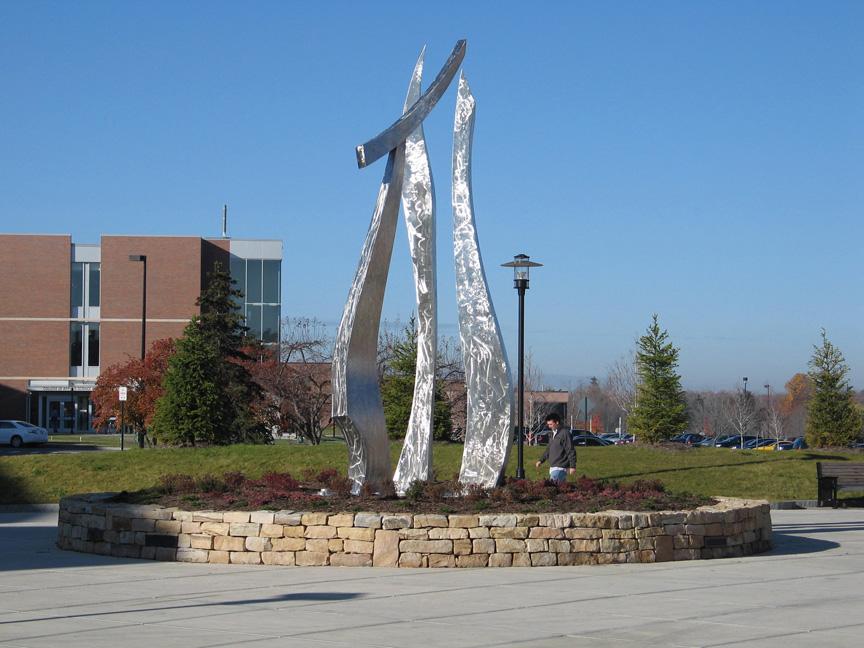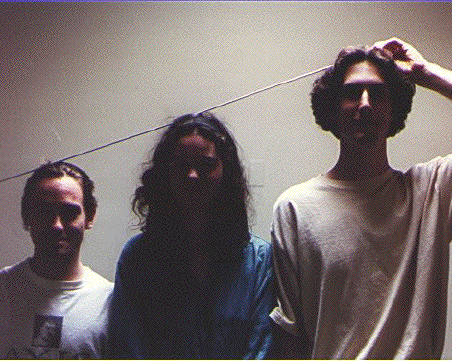Way back in 1994, two close friends of mine discovered that, when we stood side-by-side, we made an interesting symbol:
Later on, we would use this symbol as the logo for a weekly publication called Gracies Dinnertime Theatre(GDT).[1][2] Over the years, one thing we tried to do within the publication was intentionally change the layout and presentation of material, including aspects of the logo. For the founders, the logo meant both "co-operation" and "change", the idea being that the simplest stable object is a tripod, but the lack of a level surface at the top of the symbol meant a lack of permanence. From 1994 until it stopped publishing in 2005, the GDT logo and how it was used had various incarnations, but always involved the three upright columns and an angled top piece.
Despite having children and a respectable job, I look back on my time with GDT (1994 to 1998 as founder and editor, and as contributor into the 2000s) with fondness. For an upstart publication, we ended up doing things that still surprise and please me--like making up our own calendar that started on 16 July 1945 (the date of the first nuclear detonation). It seemed silly at the time but has gained support from fellow scientists.[3]
So when I first saw the "Unity" sculpture on the Rochester Institute of Technology campus, I was very surprised. The relationship between GDT and the administration of RIT was always poor: GDT was never officially a sanctioned publication and would often publish unflattering material about the college president, board members, and the school in general, GDT was an embarrassment.
On the ground, however, GDT received a great deal of support from professors, particularly those in the College of Imaging Arts and Sciences (CIA's). GDT's first "advisor" when it applied for and received a Creative Arts grant was Bruce Sodervick, a sculpture professor, and one of GDT's founding members was in the ceramics department. GDT would also regularly have Pizza and Coffee sales in the CIAS building to promote the publication and get a chance to talk with readers. To say that GDT had close ties to CIAS would be a bit of an understatement.
It should go without saying that the GDT logo was closely associated with the publication. We made shirts, stickers, even books that had the logo.
What am I to think when a GIANT GDT LOGO sculpture is erected on the RIT campus that is created by two professors in the sculpture department? I think it's pretty great! Thanks, guys!
So when I first saw the "Unity" sculpture on the Rochester Institute of Technology campus, I was very surprised. The relationship between GDT and the administration of RIT was always poor: GDT was never officially a sanctioned publication and would often publish unflattering material about the college president, board members, and the school in general, GDT was an embarrassment.
On the ground, however, GDT received a great deal of support from professors, particularly those in the College of Imaging Arts and Sciences (CIA's). GDT's first "advisor" when it applied for and received a Creative Arts grant was Bruce Sodervick, a sculpture professor, and one of GDT's founding members was in the ceramics department. GDT would also regularly have Pizza and Coffee sales in the CIAS building to promote the publication and get a chance to talk with readers. To say that GDT had close ties to CIAS would be a bit of an understatement.
It should go without saying that the GDT logo was closely associated with the publication. We made shirts, stickers, even books that had the logo.
What am I to think when a GIANT GDT LOGO sculpture is erected on the RIT campus that is created by two professors in the sculpture department? I think it's pretty great! Thanks, guys!









No comments:
Post a Comment